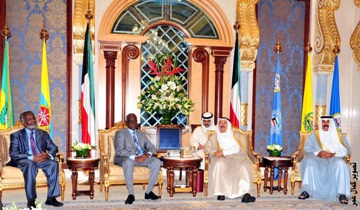Kuwait is latest stop in Sudan’s bid for economic help
October 24, 2011 (KHARTOUM) – The Sudanese First Vice President Ali Osman Taha paid a one-day visit to Kuwait for talks focused on ways the Arab Gulf state can bolster its investments to aid the beleaguered economy.

Ali Karti, Sudan’s foreign minister, said that Taha and his delegation, which included finance minister Ali Mahmood Hassanein, briefed the Kuwaiti side on the economic and political situation following the secession of the oil-rich south last July.
Sudan’s top diplomat said that the Kuwaiti Emir demonstrated enthusiasm for helping the country particularly on the economic side.
“There is great enthusiasm [by Kuwait] for investing in Sudan and there are already projects that are known and offered to the Kuwaiti side in the fields of agriculture and investment that were found acceptable to the Kuwaiti leadership,” Karti said.
He also revealed that a number of Kuwaiti businessmen and investors plan to visit Sudan in the coming period along with technical delegations to review the feasibility of investment projects offered during Taha’s visit.
“The visit opened new horizons for Kuwaiti investments in Sudan, both in the fields of agriculture and real estate development and services,” the Sudanese foreign minister said.
Sudanese officials including president Omer Hassan al-Bashir have recently embarked on visits to Arab Gulf states including Saudi Arabia and Qatar seeking help shoring the country’s troubled finances. However, it is unclear if Khartoum managed to secure any pledges during those trips.
Several analysts and observers in Sudan believe that rich Arab countries have shown little interest in helping the way they did to countries like Tunisia, Egypt and Jordan.
After having lost 75% of the oil reserves after the south’s independence, Sudan is facing double digit inflation rates and scarcity of hard currency as well as a widening budget deficit.
Because of US sanctions as well as Sudan’s heavy debt, borrowing options for the country are severely limited.
Last month the Bank of Sudan (BoS) governor Mohamed Khair al-Zubeir said that he asked Arab countries to deposit funds into his institution and commercial banks.
“I have requested the governors to deposit some reserves in the central bank and also in Sudanese commercial banks,” al-Zubeir said, adding that Sudan needs around $4 billion.
Sudan does not disclose its foreign currency exchange reserves levels but according to the report issued by the African Development Bank the country had reserves that would only cover one month of imports in 2009. Given the worsening forex situation in 2011 it is expected that reserves are at a lower level than they were two years ago.
In a related issue, Sudanese economic experts in Khartoum warned that the country faces hard days ahead because of poor management of resources.
The former undersecretary at the Ministry of Finance al-Sheikh al-Mak, said that the separation of the south is main reason behind the current economic crisis. He also projected a “bad” GDP over the next year.
Al-Mak blamed the agencies entrusted with the non-oil exports, describing it as a “failing.”
Al-Kandi Youssef, former undersecretary at the Ministry of Commerce, said that most results of the economic liberalization started in the ’90’s bucked expectations, stressing that the statements by non-professionals confused officials in dealing with the crisis.
He also claimed that this led to the plight of $13 billion in capital to Egypt and Ethiopia, adding that the travel of diplomats and people seeking medical treatment abroad has put pressure on resources.
Khartoum hopes an expansion of gold exports will bring in much-needed foreign currency and compensate for lost oil revenues.
The government predicts gold output will reach as much as 70 tons this year and bring in $3bn of revenue, potentially making Sudan the third-largest gold producer in Africa, after South Africa and Ghana. But the mining executives say that goal is well out of reach for now.
“I think if they make 20% to 30% of the $3bn, that would be good,” a managing director of a Sudanese mining firm told Reuters, declining to be named because of the sensitivity of the issue. The official target was “way too optimistic,” he said.
(ST)

